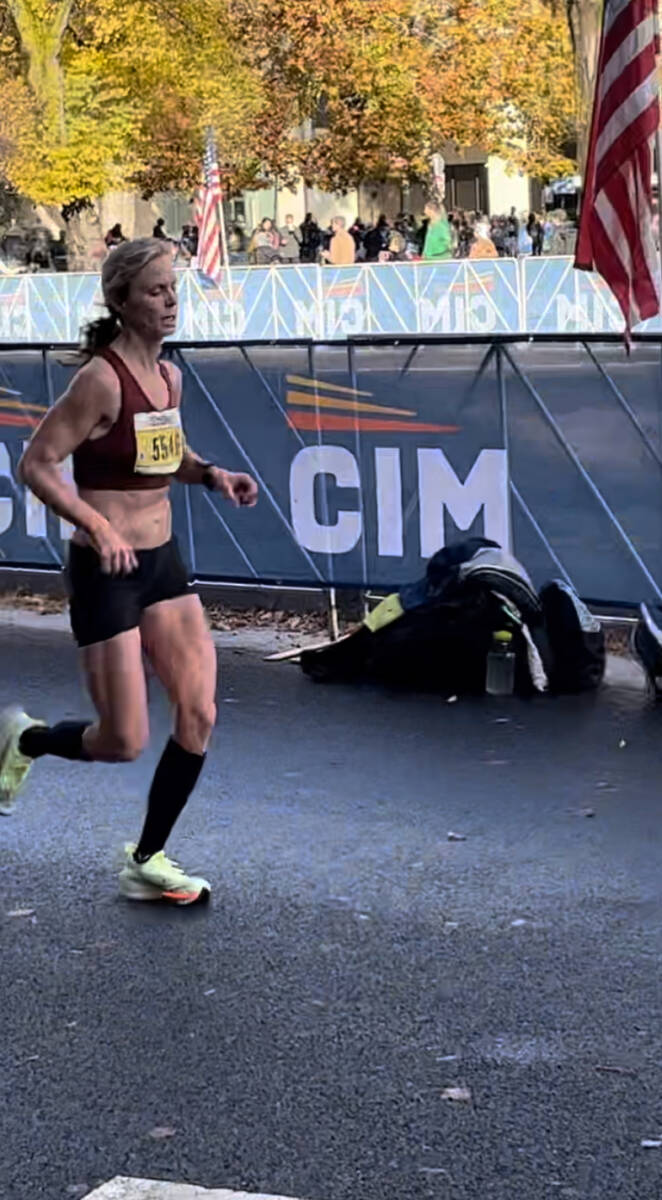How to Get Over a Bad Race, According to a Sports Psych
Bad races happen. Bad races happen to good people—and good runners. Even when everything has been meticulously planned and is all lined up for a PR—you can still have a bad race. Perhaps that’s what can be so alluring with running—especially marathons.

My Bad Race
After 2.5 years off from running due to injury, I finally came back and ran a marathon. I ran the best marathon I could run, the California International Marathon. And unfortunately, while the marathon experience itself was perfect, I had a bad race.
My legs stopped working at mile 16 and I ended up hobbling the last 10 miles for a 2:58 marathon when my training (and my heart) was set for a sub-2:50 marathon. Every mile felt so long and each mile just took longer and longer to get through.
Table of contents
I vowed I would never run a marathon again. The self-doubt swirled. Maybe I overshot my potential? Maybe I wasn’t cut out for marathons? I had no external elements to blame. The course was perfect. The weather was optimal. I nailed my nutrition. I executed my race plan. My legs just couldn’t keep up with my lungs.
And no golden retriever puppy reel was going to soothe my bad race wounds. They stung. A bad race stings. But, over time and with help from the running community, I started to make sense of my experience, find silver linings and strength.
I wanted CIM to be my redemption story. The end of my injury story. But more than anything, it was the beginning of what’s next. A new story. With disappointment, came hope.
I asked other runners, sports psychologist Dr. Haley Perlus, and mental strength coach Guilio Rancadore for advice on how to overcome a bad race. My hope is that these tips allow you to use a bad race experience as a springboard for something better and more fulfilling.
4 Steps to Recover from a Bad Race
Below are steps to recover from a bad race according to other runners and Dr. Perlus. Indeed, these are the steps I followed to recover from my bad race at CIM.
Step 1. Feel your feelings.
Go ahead. Wallow. As recreational runners, it can be easy to want to minimize our big feelings after a race. After all, it’s not our job. It’s not life or death. All of this is our choice.
Yet, we care deeply about running. I like to say that running is a lifestyle, not a hobby. It factors into almost all we do. How we eat, sleep, socialize, and more. And if you’re training for a big goal or race like a marathon, it requires a big commitment. So, own the disappointment when you have a bad race. You can be both devastated AND still grateful for the gift of running.
Step 2. Learn your lessons.
While you’re feeling your feelings, talk about them. Dr. Perlus recommends talking about your disappointing performance with your running coach or running buddies to help you identify areas that could be altered or improved.
Indeed, talking with my husband, friends and Instagram followers helped me realize that my shoes and training may need some changes. Dr. Perlus also recommends writing out the pros and cons of the race.
“Grab a pen and a notebook, then list all the positives and negatives during the race. Identify the areas that need improvement; this could be something as simple as ensuring good hydration before the race.”
Step 3. Embrace the challenge.
See the area for improvement or change as a both a challenge and hope for a better future outcome. Then come up with a plan. Don’t dread what went wrong, advises Dr. Perlus. Use this new information to stay focused on what you want to improve and provide a future goal.
I’ll share my bad race experience lessons as an example:
Lesson 1:
I believe my legs stopped working at mile 17 because I needed more long runs with race pace miles. Because I had built from zero (due to injury) in this marathon cycle, I didn’t have time for many 20+ mile runs with fast miles.
Next time, I will be sure to do more of those or alter the race time goal and begin the race more conservatively.
Lesson 2:
I also realized that I put too much importance on my time. This stole the joy from race day for me. While I loved the process of building my fitness, on race day I was all about getting a sub-2:50. I regret not soaking in the race vibes and staying to cheer others on as they finished. Instead, I just wanted to get back to the hotel.
Next marathon, I promise to have fun no matter the outcome.
Step 4. Go after the next goal.
After you have wallowed, uncovered what went wrong, and came up with a plan to fix it, now it’s time to move forward.
“Running is a journey; it’s essential to remember that a journey has bumps. One or two bad running days do not define a running career or hobby. If your performance was subpar, use this as motivation to do better for the next race ahead,” says Dr. Perlus.
Every race, good or bad, holds clues for what we can do better next time. Take the time to search for those clues so you can continue your journey. Then go sign up for that race.
15 Reasons for a Bad Race
Sometimes the cause of a bad race is an obvious smoking gun. Other times, it is an enigma.
When trying to uncover what leads to a poor running performance, look at the biggest pieces of the puzzle first. Here are 15 of those potential puzzles that could lead to a bad race.
- Training: did your fitness progress throughout your training? Did you feel energized and healthy? Did you recover well between workouts? And, were you prepared for the demands of the race? For marathoners, was the taper the right amount?
- Nutrition: Did you get enough fuel and hydration leading up to and during the race? Did you carbo load enough?
- Stomach issues: Runner’s stomach is real. If you did not train with nutrition, then you may have runner’s diarrhea or cramping. Did tummy troubles keep you from taking in enough fuel or case you to run to the potty?
- Race strategy: Did you go out too fast in your race or too conservatively? Did you push at the right times?
- Mental game: How was your headspace going into and during the race? Did you give up on yourself too early?
- Sleep: Were you well-rested and ready for the race?
- Health: How was your overall health? Were you fighting any illnesses? How are your blood levels like iron or hormones?
- Shoes and gear: How were your racing shoes? Did you run in comfortable clothes?
- Menstrual Cycle: Where were you in your menstrual cycle? Does PMS or your period usually affect your running?
- Biomechanical issues: Were your muscles firing properly? Did you do strength training in your training cycle?
- Weather: Supoptimal or bad weather during a race is always a big factor. Was it too hot, cold, or humid? Was it windy, raining, or snowing? This can greatly impact paces.
- Race Logistics: Was the race disorganized? Did you lose time at the aid stations? Have lots of turns or not know the course well?
- Terrain: Was the race hilly or too flat or have lots of turns that would have exacerbated muscle fatigue?
- Wrong goal: Was the goal you set for yourself too ambitious? Did your training set you up for success on race day?
- Extraordinary factors: Did someone else happen like a shoe coming untied or a poorly timed potty break that threw you off your game?
I thought about the lessons I would teach my kids if I quit—and what I would tell them. We can’t give up! Even if things don’t go our way.
BUT there are times when you should DNF, in my opinion.
3 Reasons to DNF a Race
- If continuing to run will do you more harm. If something hurts and is progressively getting worse as you run, then I think you need to DNF. Otherwise, you face a long layoff from running and all that comes with being injured (like high costs of time and money!).
- It is a strategic move to drop out of your race. My dear friend was going for an Olympic Trials Qualifying time last month. She wasn’t having a good day so she dropped at mile 20. And signed up for a marathon two months later. She knew that if she didn’t complete the 26.2 miles, she could continue to train and have a better shot on a better day. Pros and elites often make these judgment calls.
- You just can’t keep going. If I was running an ultra and my legs felt the way they did at CIM, I would have had to DNF. Sometimes your body just cannot do it. And it is so frustrating. But we TRY to learn and move on.
The good news is, when running a marathon, you have a lot of time to think about what the best decision for you is.
It’s possible getting a running coach can help you overcome variables that can lead to a poor race such as an overly ambitious goal, poor training, or inexperienced racing strategies. Check out my run coaching services if you’d like to learn more about my coaching! And now, I want to hear YOUR bad race war story!






